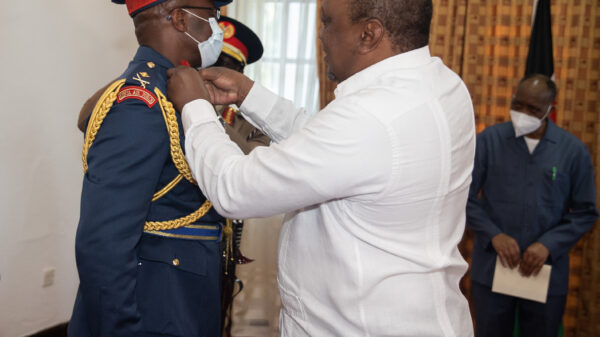I extend my appreciation and gratitude to everyone, representatives of the various actors and state organs in the justice sector, learned counsel, members of the public, and court staff, who have joined us for this inaugural sitting of the Supreme Court following the Court’s recent reconstitution.
I would like to thank my brother and sister judges of the Court and retired judges who have worked tirelessly over the past decade to position the Supreme Court of Kenya as a respected and admired Court in the globe. It is worth mentioning that the Court’s indigenous jurisprudence in areas like electoral law, human rights (questions on mandatory death penalty and right to housing), the workings of the devolved system of government and the practice of bicameralism in our legislative system is cited and talked about with admiration by scholars and other courts regionally and internationally.
Our focus will be to build on this strong foundation in the next decade. There is no doubt that the adoption of the current Constitution in 2010 is the most consequential event for our generation. The Constitution stands as the most progressive pillar for Kenyan law and as a comprehensive guiding compass for Kenya’s internal organisation and global posturing.
It must be appreciated that the Constitution in its values, principles and rules reflects the desire by Kenyans to break with our country’s past of authoritarian governance and unequal society and strike in a radically different path of creating a democratic and egalitarian state and society. It is the foremost manual on the creation and sustenance of a welfare state meeting the needs of Kenyans wherever they are.
The Constitution reflects the kind of society that Kenyans wish to build for themselves and for future generations. It reflects a desire by Kenyans to build a socially just state and society. This is a bold pronouncement of the aspirations and purposes that should animate all actions by state and nonstate actors. Thus, for the Supreme Court and other courts, the development of a jurisprudence of social justice, or put differently, a social justice jurisprudence will be our guiding north star in the next decade.
In essence, our role will be to guide other Courts to broaden the administration of justice in a manner that is owned by Kenyans, socially transformative and empowering for communities. The pronouncement in the preambular provisions of the Constitution, Article 10 on the values and principles of national governance, and Article 19(2) on the purpose of the Bill of Rights, leads to the inescapable conclusion that the Constitution is a charter for social transformation.
Given that the Supreme Court is the final custodian and guarantor of the Constitution, the Supreme Court will endeavour to provide jurisprudential leadership to the country in the quest for transformation of the society using the Constitution as a tool of social change. We will seek to put in practice the instruction, indeed the command, in Articles 20(3) and 259 of the Constitution and Section 3 of the Supreme Court Act that courts should develop the law to ensure that the vision of the Constitution is realised.
The Court in its operations and functioning will place a premium on collegiality and civility. By emphasising on collegiality, I mean that as judges we are working on a joint project of deciding the matters before us impartially and independently to clarify the law, thus the need for sharing of ideas and enriching our perspectives to resolve the disputes before us.
This does not however mean that difference of opinion is not encouraged; rather it means that judges have a duty to disagree in a principled manner. Given that ours is an adversarial legal system, that tends to pit parties against each other, it tends to encourage hostility and often leads to uncivil attacks directed to judges and to counsel on the opposite side.
Such a situation weakens public confidence in the judicial process. My expectation is that the bar, while having the leeway and indeed encouraged to engage robustly and skilfully as they can, will appreciate the importance of civility. Thus, where one has a different opinion, it will be expressed in a manner that respects the adage of “disagreeing without being disagreeable”. Allowing judges to decide the substantive issues instead of diverting their time to sideshows of who has crossed the line to disrespect and undermine the dignity of the court.
It will also be the Court’s duty to settle monumental and troubled questions of law affecting the society and seek to intervene to ensure that the justice system is operating effectively as intended by the Constitution and our laws. Towards this end, the Court is sitting today to issue directions with respect to the implications of the landmark decision by the Supreme Court in the Francis Muruatetu decision for the smooth and efficient operations of the criminal justice system.
The Francis Muruatetu case is a landmark decision in our human rights jurisprudence. The Supreme Court held that sentencing is a judicial not a legislative function under the principle of separation of powers that underpins our constitutional order. Further, since there may be varying degrees of criminal culpability, participation, and heinousness, not all murders are the same and thus the need for mitigation in murder trials and indeed in capital offences where the accused person is facing a death sentence.
Therefore, it is improper to impose the same punishment for all murders. The mandatory death penalty was thus found to be unconstitutional and an order for the re-sentencing of the applicants by the trial court was made. The decision is undoubtedly a landmark decision for sentencing policy in Kenya and a good example of the impact of the Bill of Rights on punishment and the criminal justice system.
It reiterates that constitutional values should be respected in the imposition of punishment for crimes. While Muruatetu obviously was limited to the death penalty in murder cases, the principles the decision pronounced has had far-reaching implications with ramifications for sentencing in all criminal cases. Indeed, the Court of Appeal and the High Court have extended these principles to cases of robbery with violence and other criminal cases where legislation prescribes minimum and mandatory sentences.
This is the situation we intend to clarify in the directions. While the principles of Muruatetu are arguably directly transferable to other cases of mandatory sentences, there is a live debate as to whether they are equally applicable in circumstances where the legislature merely prescribes minimum but not mandatory sentences.
That live controversy will be resolved at the appropriate time when such cases reach the Supreme Court through the usual appellate process. It is noteworthy that the Supreme Court in the Muruatetu decision made the following orders: “c) The Attorney General, the Director of Public Prosecutions and other relevant agencies shall prepare a detailed professional review in the context of this Judgment and Order made with a view to setting up a framework to deal with sentence re-hearing cases similar to that of the petitioners herein. The Attorney General is hereby granted twelve (12) months from the date of this Judgment to give a progress report to this Court on the same.
d) We direct that this Judgment be placed before the Speakers of the National Assembly and the Senate, the Attorney-General, and the Kenya Law Reform Commission, attended with a signal of the utmost urgency, for any necessary amendments, formulation and enactment of statute law, to give effect to this judgment on the mandatory nature of the death sentence and the parameters of what ought to constitute life imprisonment.” It is pursuant to those orders which were in the nature of a structural interdict that we convene to issue directions on post-judgment hearing as a follow up on the implementation of the Muruatetu decision.
The aim of the directions and postjudgment hearing is to enable the Court to get a report on the progress of the development of a framework for resentencing hearings and any difficulties that has been faced in the implementation of the judgment so that the Supreme Court can offer appropriate directions and orders that will ensure that the criminal justice system works optimally. As a matter of priority, I will be consulting the Attorney General, other actors, and stakeholders in the criminal justice system to put together a committee on revising the sentencing guidelines in line with these directions.
Lastly, it would be remiss to conclude without mentioning and expressing my gratitude to the judges and staff of this court and indeed all judicial officers and staff of the judiciary for the hard work they have put in to ensure that our courts are running since the pandemic struck a year ago. The pandemic has changed the way the Supreme Court and
other courts have been operating. It has forced us to accelerate the embrace of information technology in our operations. The Supreme Court has embraced video/remote hearings to ensure that the delivery of justice does not stall, I thank the court staff, judges, and the bar for enthusiastically embracing these changes even as we work to resolve the teething problems experienced and to ensure that our processes get more efficient as times go by. On that note, I wish to assure Kenyans that the Supreme Court and its judges don’t live in ivory towers.
We are part of the Kenyan society and we are acutely aware of the burden of nurturing social transformation that the Constitution has imposed on us. But as judges, we will remain independent and impartial as directed by the Constitution and you will allow us to speak mainly through our judgments and not to respond to matters that are not before us. Thank You.
Justice Martha Koome, Chief Justice and President of the Supreme Court of Kenya
























































